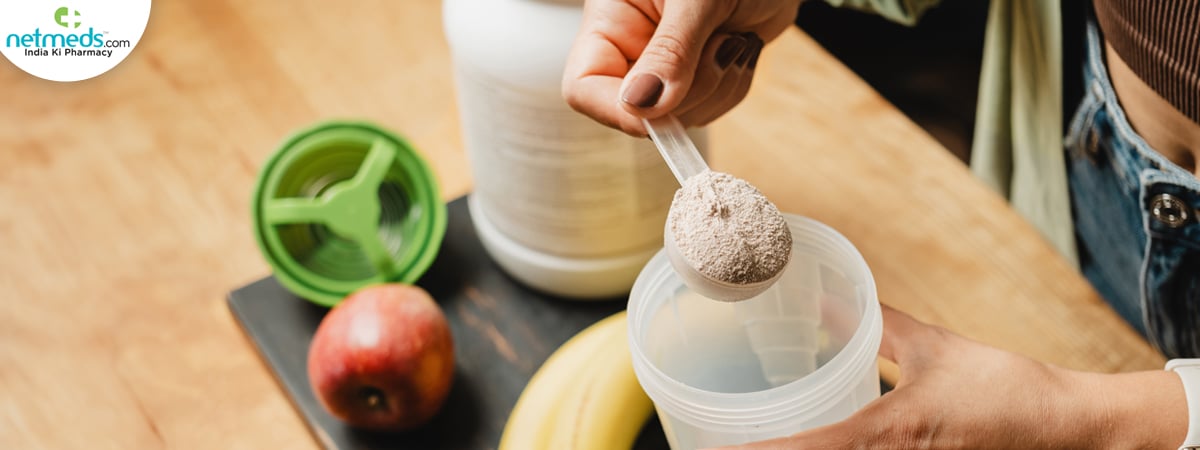Creatine supplements have long been valued and famed among athletes and fitness enthusiasts. However, in recent years, it has gained attention as a powerful nutritional supplement for augmenting women’s health and performance. Whether your fitness goals are to build lean muscle, lose fat, support hormonal balance during menopause, or stay strong over 40, this protein powder can help immensely.

Read this article to learn more about how creatine benefits women, recommended intake, and possible side effects.
What Is Creatine?
Creatine is a protein compound found naturally in your muscles, made from a group of amino acids such as arginine, glycine, and methionine. It supports muscles that produce energy (ATP) during short periods of intense exercise like sprinting, weightlifting, or HIIT.
Though the body produces creatine, supplementation can improve muscle reserves, enhance energy, endurance, and recovery.
Also Read: Egg White Protein: Nutrition, Health Benefits, Uses, and Side Effects
Why Should Women Take Creatine?
Creatinine has always been seen as a “men’s supplement” traditionally, but it delivers some distinct wellness benefits for women, too. Several studies have revealed that women generally have a lower creatinine level, thus making supplementation more beneficial.
Benefits of Creatine for Women
Supports Hormonal Balance
Women who experience hormone imbalances in the sex hormones estrogen and progesterone can experience fluctuating creatinine levels. However, studies have proven that taking creatinine supplements regularly can help improve and balance hormones.
Improves Strength
Creatinine is an important element in most sports nutrition supplements. Creatinine supplements can promote athletic performance in those who do high-intensity exercise or heavy lifting by increasing muscle energy reserves. Furthermore, it may promote athletic endurance by enhancing post-exercise recovery and preventing injury.
Build Lean Muscle Mass
Creatinine is known to build muscle mass by improving the energy in muscle cells and decreasing muscle protein breakdown during strenuous physical activities like strength training. Regular addition of creatinine supplements into fitness regimen helps women build lean muscle mass, promote muscle tone without adding bulk and body weight.

Enhances Brain Function
Brain activities increase energy requirements. A few studies have revealed that creatinine may lower mental fatigue in times of stressful situations and cognitive tasks and augment short-term memory and reasoning.
Supports Bone Health
Creatinine supplement, when taken along with resistance training, may strengthen bones and muscles, thus reducing the risk of fractures and falls. In addition, it may help sustain bone mineral density and prevent the risk of osteoporosis.
Recommended Creatine Intake for Women
The regular dosage for women is the same as for men, as your muscles can only store a limited amount.
Daily dose: 3–5 grams of creatine monohydrate per day.
Also Read: Best Protein Supplements for Women: Uses, Benefits, Types, and Side Effects
Pro-Tip: Having creatine with a meal or post-workout shake containing carbs or protein can support better absorption.
Possible Side Effects
Creatine is safe and well-studied, but mild side effects can occur if not used properly. Taking creatinine in doses of more than 20 grams per day may lead to water retention temporarily. And doses higher than 10 grams per day may trigger gastrointestinal symptoms such as bloating and diarrhoea.
To avert side effects, experts recommend taking smaller doses of creatinine for extended periods, like 3-5 grams per day for four weeks, rather than large doses for short periods.
Remember that taking creatinine supplements may temporarily elevate blood creatinine levels, which is one of the markers of a kidney function test. If the levels are higher, it indicates kidney issues. Creatinine supplements are safe for healthy adults, as the increase is temporary; however, those with kidney problems should avoid taking creatinine supplements.
Good hydration is vital when taking any protein supplements, as it helps the system flush out toxins.
Conclusion
Creatine is a versatile and powerful addition to any woman’s health routine. Taking creatinine supplements in the recommended dose supports physical stamina, hormonal health, cognitive function and overall well-being, without any side effects.
(This article is reviewed by Kalyani Krishna, Chief Content Editor)
Author Profile:
M Sowmya Binu
With over 15 years of expertise and a Postgraduate degree in Nutrition, M Sowmya Binu is a seasoned professional in the field of nutrition. Specialising in tailoring personalised diet plans, she underscores the significance of a balanced approach to health, emphasising the integration of medication with dietary intake for holistic wellness. Passionate about equipping individuals with knowledge to make informed decisions, Sowmya adeptly develops insightful content encompassing various topics, including food, nutrition, supplements, and overall health.
References:
Creatine Supplementation in Women’s Health: A Lifespan Perspective
Abbie E Smith-Ryan 1,2,*, Hannah E Cabre 1,2, Joan M Eckerson 3, Darren G Candow 4
https://pmc.ncbi.nlm.nih.gov/articles/PMC7998865/
https://www.tandfonline.com/doi/full/10.1080/15502783.2025.2502094
Creatine Supplementation Beyond Athletics: Benefits of Different Types of Creatine for Women, Vegans, and Clinical Populations—A Narrative Review
by Jorge Gutiérrez-Hellín 1,*ORCID,Juan Del Coso 2,*ORCID,Arturo Franco-Andrés 1



 Previous
Previous